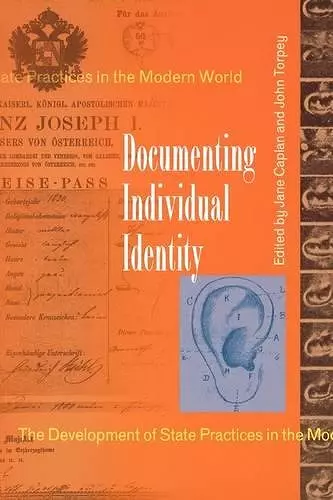Documenting Individual Identity
The Development of State Practices in the Modern World
John Torpey editor Jane Caplan editor
Format:Paperback
Publisher:Princeton University Press
Published:9th Jan '02
Currently unavailable, and unfortunately no date known when it will be back

Documenting Individual Identity is a distinguished collection that opens up a new area of historical and sociological inquiry. On almost every topic the authors have thought widely and deeply, and they back up their general points with interesting, detailed research. -- Theodore Porter, University of California at Los Angeles Overall, the essays in this book show the increased rigidity of formal documents and control over the individual, the discrimination between the citizen and the foreigner, and increased categorization of the individual in general. Many of them contain nuggets of stories, descriptions, or analytical observations which make the reading rewarding in unexpected ways. -- Elazar Barkan, Claremont Graduate University
Addresses the techniques and mechanisms by which official agencies certify individual identity, from passports and identity cards to labor registration and alien documentation, from fingerprinting to much-debated contemporary issues such as DNA-typing, body surveillance, and more.This book addresses one of the least studied yet most pervasive aspects of modern life--the techniques and mechanisms by which official agencies certify individual identity. From passports and identity cards to labor registration and alien documentation, from fingerprinting to much-debated contemporary issues such as DNA-typing, body surveillance, and the catastrophic results of colonial-era identity documentation in postcolonial Rwanda, Documenting Individual Identity offers the most comprehensive historical overview of this fascinating topic ever published. The nineteen essays in this volume represent the collaborative effort of historians, sociologists, historians of science, political scientists, economists, and specialists in international relations. Together they cover a period from the emergence of systematic practices of written identification in early modern Europe through to the present day, and a geographic range that includes Europe, the Soviet Union, North and South America, and Africa. While the book is attuned to the nefarious possibilities of states' increasing capacity to identify individuals, it recognizes that these same techniques also certify citizens' eligibility for significant positive rights, such as welfare benefits and voting. Unprecedented in subject and scope, Documenting Individual Identity promises to shape a whole new field of research that crosses disciplinary boundaries and is of broad public and academic significance. In addition to the editors, the contributors are Valentin Groebner, Gerard Noiriel, Charles Steinwedel, Marc Garcelon, Jon Agar, Martine Kaluszynski, Peter Becker, Anne Joseph, Kristin Ruggiero, Andrea Geselle, Andreas Fahrmeier, Leo Lucassen, Pamela Sankar, David Lyon, Gary Marx, Dita Vogel, and Timothy Longman.
"This collection of essays examines the ways in which official agencies have sought to certify the identities of individuals throughout history, from the development of paper bureaucracy in Renaissance Italy and France and the subsequent invention of national citizenship, to the census and the development of police practices including warrants and fingerprinting. Intriguing points abound."--Steven Poole, The Guardian "The essays are uniformly rigorous, well-written, and fascinating."--Barbara Cruikshank, American Journal of Sociology
ISBN: 9780691009124
Dimensions: unknown
Weight: 595g
432 pages